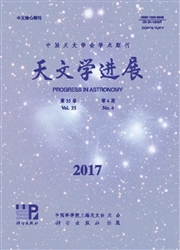

 中文摘要:
中文摘要:
回顾并展望了广义相对论理论及其实验检验的发展状况和趋势,包括广义相对论高精度实验检验的主要研究内容和研究方向,与之相关的深空探测项目的规划和进展。鉴于广义相对论的实验检验内涵极其丰富,限于篇幅重点介绍了有关的太阳系实验。首先介绍爱因斯坦等效原理及其实验检验;该原理是广义相对论的基石,内容包含了弱等效原理、局部洛伦兹不变性以及局部位置不变性。接着介绍相对论性引力理论的实验检验,主要涉及对参数化后牛顿参数的测定。最后,针对我国未来有望实施的深空探测任务,就其在广义相对论实验检验中可开展的自主研究与实践给出建议。
 英文摘要:
英文摘要:
With the development of the unprecedented techniques for observations and the improvement of the advanced methods for measurements, general relativity has passed all of the tests in the solar system with flying colors, which included Einstein equivalence principle,the light deflection, the Shapiro time delay and the perihelion advance of Mercury. Even the gravitational wave predicted by the general relativity has been detected by using the timing model of binary pulsar systems indirectly. However, there are many important reasons to question the validity of general relativity and to determine where it will be violated. Thus,high-precision experiments in the solar system offer some new opportunities for probing gravitation in the spacetime. In this paper, the development status and trends of general relativity and its experimental tests are reviewed and outlooked, which include the mainresearch content on highly accurate experimental tests of general relativity and some plan and progress in deep space missions for testing it. First of all, Einstein equivalence principle and its tests is presented. This principle is the cornerstone of the general relativity and it contains three parts: the weak equivalence principle, the local Lorentz invariance and the local position invariance. Second, experimental tests of relativistic gravitation's theories are discussed, which are mainly focused on measuring the parametrized post-Newtonian parameters. Focusing on Chinese deep space missions in the future, we give some advices on their application to gravitational tests.
 同期刊论文项目
同期刊论文项目
 同项目期刊论文
同项目期刊论文
 New upper limits on deviation from the inverse-square law of gravity in the solar system: a Yukawa p
New upper limits on deviation from the inverse-square law of gravity in the solar system: a Yukawa p On the (im)possibility of testing new physics in exoplanets using transit timing variations: deviati
On the (im)possibility of testing new physics in exoplanets using transit timing variations: deviati Relativistic transformations between global and local velocities of an orbiter under IAU Resolutions
Relativistic transformations between global and local velocities of an orbiter under IAU Resolutions Relativistic transformation between τ and TCB for Mars missions: Fourier analysis on its accessibili
Relativistic transformation between τ and TCB for Mars missions: Fourier analysis on its accessibili Preliminary limits on a logarithmic correction to the Newtonian gravitational potential in the solar
Preliminary limits on a logarithmic correction to the Newtonian gravitational potential in the solar 期刊信息
期刊信息
